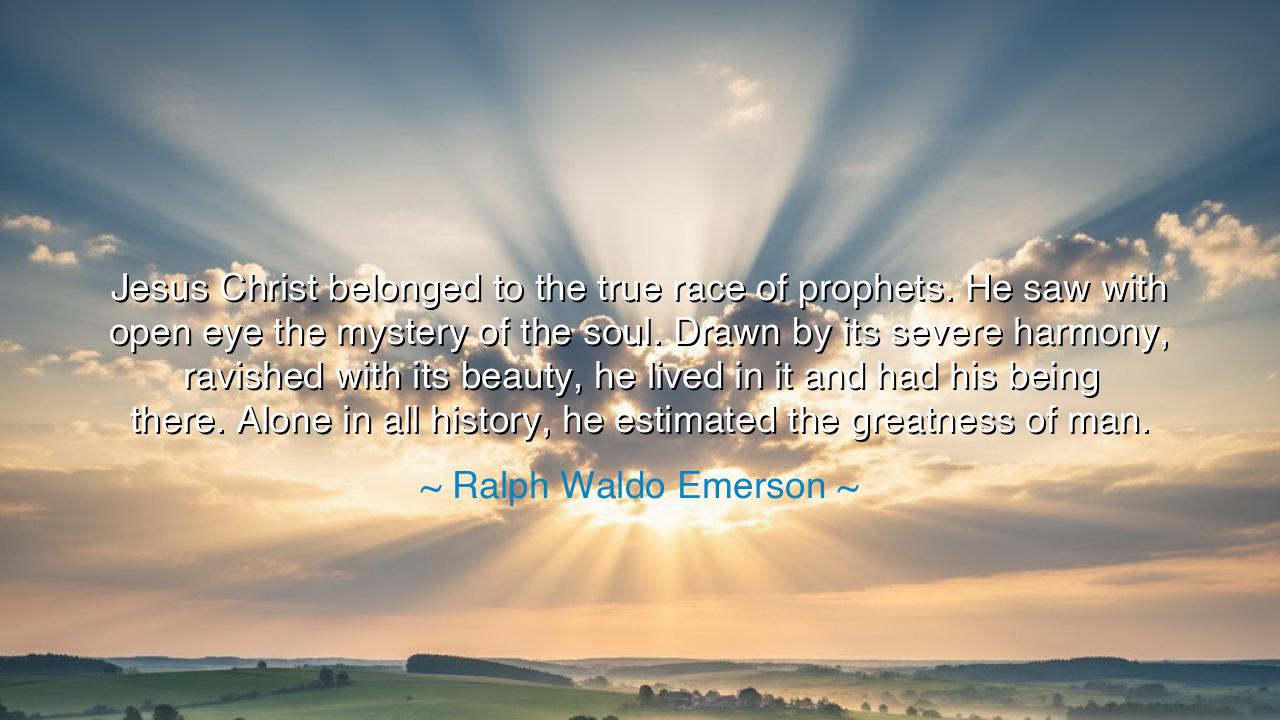
Jesus Christ belonged to the true race of prophets. He saw with
Jesus Christ belonged to the true race of prophets. He saw with open eye the mystery of the soul. Drawn by its severe harmony, ravished with its beauty, he lived in it and had his being there. Alone in all history, he estimated the greatness of man.






"Jesus Christ belonged to the true race of prophets. He saw with open eye the mystery of the soul. Drawn by its severe harmony, ravished with its beauty, he lived in it and had his being there. Alone in all history, he estimated the greatness of man." These words by Ralph Waldo Emerson capture the profound nature of Jesus Christ’s vision—a vision that transcended the limitations of the material world and penetrated deeply into the mystery of the soul. Emerson speaks of Christ not just as a figure of spiritual significance, but as a seer, a prophet who perceived the true essence of humanity, not as the world saw it, but as it could be—in its highest form, unified with divine purpose and harmony. In this way, Christ was not just a teacher, but a visionary who truly understood the depth and potential of the human spirit.
In the ancient world, the role of the prophet was not merely that of a forecaster of events, but a profound spiritual guide—a figure who could peer beyond the visible realm and reveal the unseen to the people. Prophets like Isaiah and Ezekiel of the Hebrew Bible saw the soul of humanity in a light that others could not, their words laden with the weight of divine inspiration. But Jesus was different. Unlike the prophets before him, Christ was not only the messenger of divine wisdom but the embodiment of that wisdom. His deep understanding of the human soul was not merely intellectual but experiential—he lived in the very heart of the mysteries he spoke of. He was a man who was both divine and human, understanding the frailties of the human condition while also seeing the glory and potential that lay within it.
Jesus's perception of humanity was unique in its depth. Whereas many people throughout history have seen human beings as frail and prone to error, Christ saw the beauty and greatness in the soul of every individual. In the Gospels, Christ speaks of the Kingdom of God not as something that exists in the afterlife, but as something that is within us—"the kingdom of God is within you." This teaching reveals that Christ’s view of humanity was not as fallen or insignificant, but as capable of great divine potential. He saw human beings as capable of redemption and greatness, not merely as servants of God but as beings who could ascend to the divine through love, compassion, and spiritual awakening.
Consider the moment when Jesus healed the blind, restoring sight to those who were lost in the darkness. This act was not simply a miracle of physical healing but a spiritual awakening. It was a symbol of how Christ saw the blindness in the world—not merely a physical condition but the spiritual blindness that plagues humanity when it fails to recognize its higher calling. Just as he healed the blind, he sought to awaken the soul of man to the higher truths that lay dormant within. Christ understood the soul as a vessel of divine light, and his mission was to help humanity see not just with the eyes, but with the heart, the soul, and the spirit.
In this light, the greatness of man that Emerson speaks of is found not in our physical might, nor in our intellect, but in our ability to live in harmony with the divine nature that resides within us. Christ did not come to praise human achievement, but to awaken the divine spark in every person. This divine potential, this greatness, is often buried beneath the struggles and limitations of life, but Christ’s message was one of hope—a message that spoke of the soul's infinite capacity for love, compassion, and forgiveness. Through his teachings, he sought to liberate the soul from the chains of suffering and ignorance, and to guide it back to the divine truth.
Emerson’s reflection on Jesus emphasizes that true greatness is not measured by external power or achievements, but by the depth of understanding one has of the human soul. Christ was a teacher, yes, but he was also a prophet—a figure whose insight and wisdom came from his divine connection to the soul of humanity. Jesus's greatness lay in his ability to see the unseen, to look into the heart of each individual and see not their faults, but their potential to rise above them. His understanding of the soul was not theoretical but a lived reality, embodied in every word he spoke and every action he took.
The lesson from Emerson and Christ is this: greatness is not something that comes from external circumstances but from the deep, transformational understanding of the soul’s potential. We are all capable of greatness, but we must first recognize the divinity within us and others. Let us look at the world not with judgment or disdain, but with the eyes of a prophet, seeing the beauty and potential in every human soul. Like Christ, we are called to awaken not just the minds of others, but their spirits—to help them see the truth of their divine nature. In doing so, we bring about a transformation, not only within ourselves but in the world around us.






AAdministratorAdministrator
Welcome, honored guests. Please leave a comment, we will respond soon